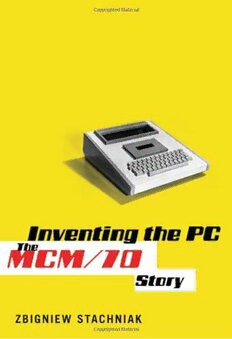
Inventing the PC: The MCM/70 Story PDF
Preview Inventing the PC: The MCM/70 Story
Inventing the PC This page intentionally left blank Zbigniew Stachniak INVENTING THE PC (cid:2)(cid:2)(cid:2)(cid:2)(cid:2)(cid:2)(cid:2)(cid:2)(cid:2) THE MCM/70 STORY McGill-Queen’s University Press Montreal & Kingston | London | Ithaca © McGill-Queen’s University Press 2011 ISBN 978-0-7735-3852-8 Legal deposit second quarter 2011 Bibliothèque nationale du Québec Printed in Canada on acid-free paper that is 100% ancient forest free (100% post-consumer recycled), processed chlorine free This book has been published with the help of a grant from the Canadian Federation for the Humanities and Social Sciences, through the Aid to Scholarly Publications Program, using funds provided by the Social Sciences and Humanities Research Council of Canada. McGill-Queen’s University Press acknowledges the support of the Canada Council for the Arts for our publishing program. We also acknowledge the financial support of the Government of Canada through the Canada Book Fund for our publishing activities. Library and Archives Canada Cataloguing in Publication Stachniak, Zbigniew, 1953– Inventing the PC : the MCM/70 story / Zbigniew Stachniak. Includes bibliographical references and index. ISBN 978-0-7735-3852-8 1. MCM/70 (Computer). 2. Microcomputers – Canada – Design and construction – History. 3. Computer engineering – Canada – History. I. Title. QA76.8.M43S73 2011 004.165 C2011-900297-3 Set in 10/14 Sabon with OCR A Book design & typesetting by Garet Markvoort, zijn digital TO THE MAKERS OF THE MCM/70 This page intentionally left blank CONTENTS (cid:2)(cid:2)(cid:2)(cid:2)(cid:2)(cid:2)(cid:2)(cid:2)(cid:2) Acknowledgments ix Introduction 3 1 At the Beginning, There Were Two 9 2 Inventing the PC 22 3 The Making of the MCM/70 38 A new era in integrated electronics 39 The team 44 From the key-cassette to the M/C prototype 46 MCM/APL 54 The production model of the MCM/70 62 4 Unveiling the Future 65 5 It’s All About Power 80 Too much with too little? 81 Sharing the power – the venture capital way 92 The power supply that blacked out MCM 103 CONTENTS 6 Changing Fortunes 114 I do have a fighting position 117 A revolution of his own 119 Kutt’s last stand 125 Horned angels of hard-pressed entrepreneurs 132 7 The Day After 137 President Berg 138 Recycling the past 143 Williams for Berg 147 An APL machine to the end 151 Conclusions 164 Welcome to the computer age! 166 The MCM/70 personal computer 169 We could have been Apple 175 Why was the MCM/70 forgotten? 182 MCM Timeline 189 Notes 197 Bibliography 203 Index 209 viii ACKNOWLEDGMENTS (cid:2)(cid:2)(cid:2)(cid:2)(cid:2)(cid:2)(cid:2)(cid:2)(cid:2) I wish to express my gratitude to many people who over the years have contributed to my research on Micro Computer Ma- chines and who, through their donations, helped to build the MCM collection at the York University Computer Museum. I am particularly indebted to Mers Kutt for making his personal MCM archive available to me, for granting hours of interviews, and for enduring detailed questioning. To the late Kenneth Iverson I owe special thanks for the gift of his time and his in- valuable recollections of APL’s development at IBM. A great debt of gratitude is due to former MCM employees who have supported my work through interviews, discussions, and donations of MCM documents and technical literature. André Arpin, Cam Farnell, Don Genner, Lorne Gladstone, José Laraya, Gordon Ramer, Reg Rea, Barrie Robinson, Glen Seeds, Morgan Smyth, and John Woods have offered not only their help through meetings and interviews but also their sincere en- couragement for my MCM project. I wish to acknowledge help- ful comments received from other former MCM employees and users of MCM products. Particular thanks go to David Borrow- man, Ned Chapin, Ted Edwards, Haron Ezer, Mike Jenkins, J. Maika, Daniel Pimienta, Glenn Schneider, and John Wallace. For their recollections of early microprocessor development ac- tivities at Intel I would like to thank Marcian E. Hoff, Jr, Stanley Mazor, and Hal Feeney. I offer my thanks to William Kindree for long discussions on the history of the APL programming language and early mainframe computer industry.
